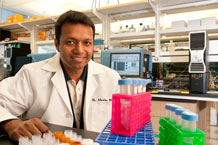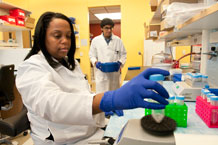Probing poor prognoses for breast cancer
The survival of women with the same type and same stage of breast cancer varies considerably, even when they receive the same treatment. These variations are thought to be primarily due to genetic factors.
One thing that does not vary, however, is the fact that women who get breast cancer before the age of 50 are less likely to survive than those who come down with the disease later in life. They are also more likely to experience a recurrence.
A new research project at the University of Chicago is tackling both these issues for the first time by examining more than 600,000 markers, or elements, in the genes of 4,000 women who got breast cancer early and have had the disease for at least 10 years. The goal of the research is to determine what genetic variations account for the low survival and high recurrence rates among such patients. This work is being made possible by a two-year $1million American Recovery and Reinvestment Act grant funded by the National Cancer Institute. So far, two full-time positions have been created with these funds.
"We hope that this study will identify specific genetic variations that can be used to predict breast cancer outcomes among women with early onset breast cancer," says Habibul Ahsan, MD, Professor of Health Studies, Medicine and Human Genetics at the University of Chicago and Director of the Center for Cancer Epidemiology and Prevention at the University's Comprehensive Cancer Center.
If the researchers are successful, a blood test could be used to identify women with a better or worse prognosis for their early onset breast cancer. The researchers will also develop new strategies for disease detection, treatment and prevention.
"The research project will also generate knowledge that will advance future pharmacological, translational, epidemiological and basic research with an enormous potential for enhancing the care of patients with breast cancer," Ahsan says.
Strength in numbers
In the past, Ahsan has used data covering large populations of people to study genetic risk factors, the health effects of being exposed to arsenic in drinking water, and the effects of selenium and vitamin E supplements to prevent cancer among individuals with pre-malignant skin lesions.
One key to success with this type of broad, genetic, population-based research is that it is feasible only with extensive collaboration involving a large number of researchers with complementary expertise, according to Ahsan.
"I've been interested in cancer prevention and population-based research since the beginning of my academic career," he says. "With the breakthroughs in modern genomic knowledge following in the wake of the Human Genome Project and with the new tools developed over the past several years, I have been increasingly incorporating genomics in my prevention and population-based research. By working with others, we now have the potential to identify novel genetic alterations that are predictive of breast cancer outcomes."
by Greg Borzo
This award is funded under the American Recovery and Reinvestment Act of 2009, NIH Award number: 1RC1CA145506-01. For more information on NIH's Recovery Act projects, visit http://recovery.nih.gov/.












